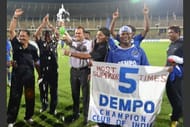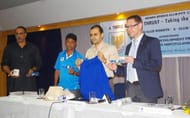There are suggestions that in the Papas era, Dempo will be going through a phase of transition as some senior players have left but Mr. Dempo gave a more concrete perspective.
“If you see our team for the upcoming season, almost 75% of the players have been retained hence we cannot say it is an entirely new team. Yes, there have been a few additions in the form of foreign and Indian players but the balance of youth and experience has been maintained. If we continue our hard work with determination, success too will follow,” he notified.
The Dempo boss, who is also the current president of GFA (Goa Football Association) and AIFF vice-president, doesn’t mind the new rule of allowing four foreigners to start in the I-League but also talked about the importance of bringing Indian players through, something which Dempo consistently did during Armando’s tenure.
“I think every team has the right to maintain its competitiveness, and if that translates into fielding an extra foreigner then we don’t mind doing it. But we would also like to improve our Indian players so that they can match their international counterparts.
“This is a process and it may take time, but we are committed to developing Goan and Indian footballers. In the past we have shown that as there used to be at least five-six players from Dempo in the Indian national squad,” he pointed out.
Mr. Dempo confirmed that land for the new academy and stadium has been acquired but the club are still awaiting government clearances. The owner of the most successful club in I-League history also gave a little insight on the benefits of their partnership with Danish outfit FC Midtjylland.
“We had successful coaching exchange programs with FC Midtjylland and had also sent some of our promising players to train at their academy. These activities were very useful and we hope of continuing them in the future,” he said.
The Dempo owner also remains optimistic about the talks between IPFCA (I-League Professional Football Clubs’ Association) and AIFF regarding the new changes in the I-League and Federation Cup format. The highly successful businessman acknowledges the difficulties of currently running an I-League club as there are no financial returns from Indian football but remains hopeful of a brighter future.


